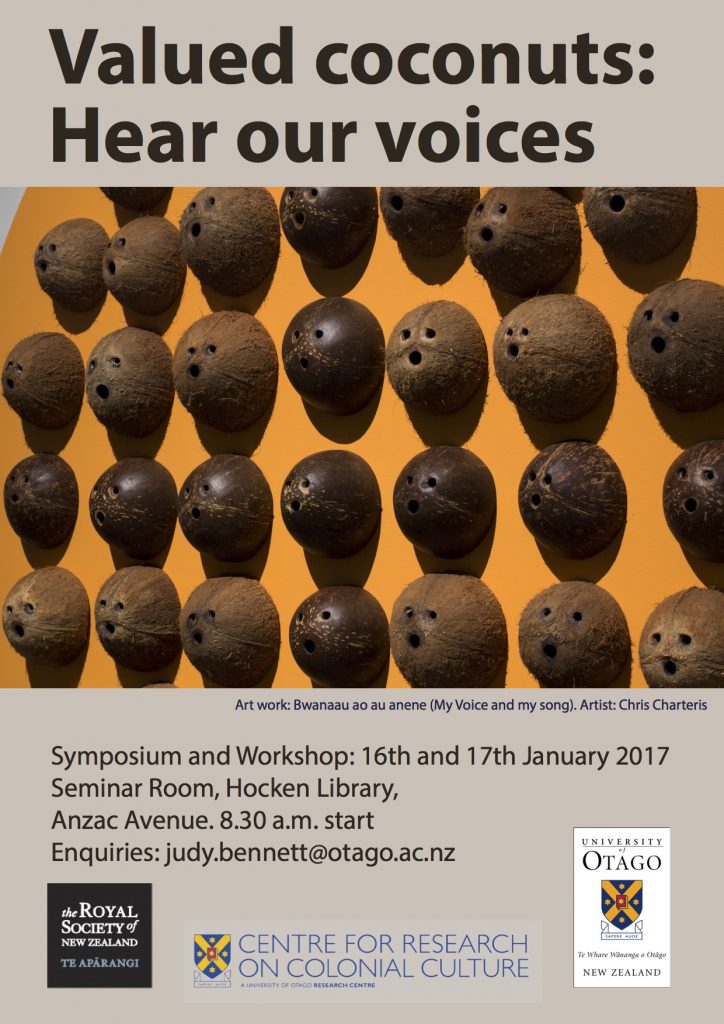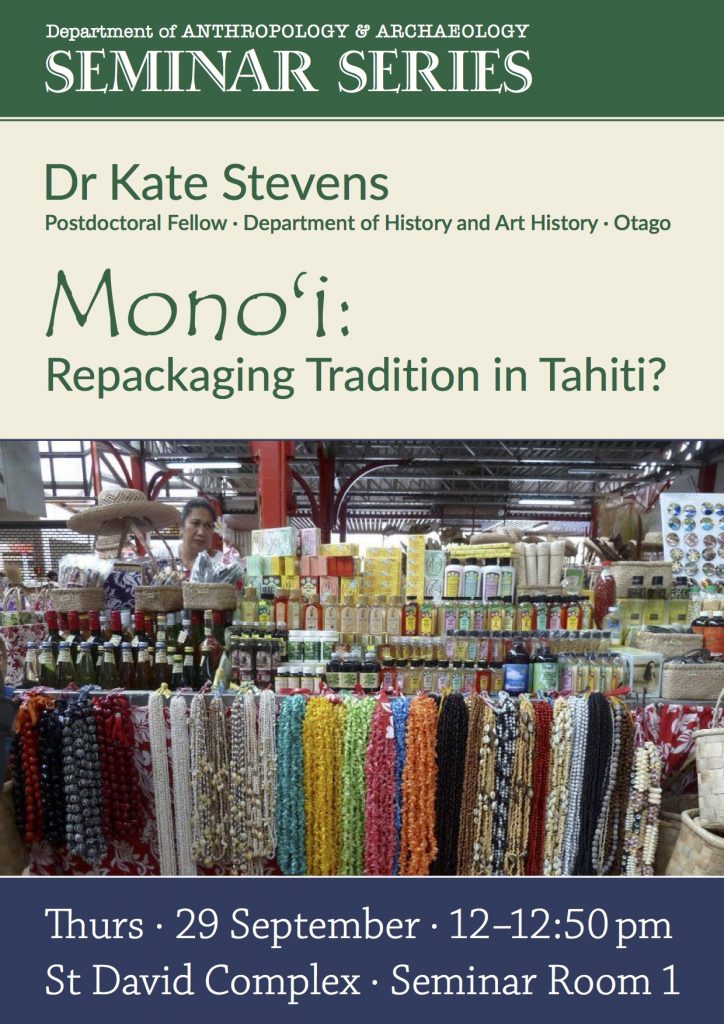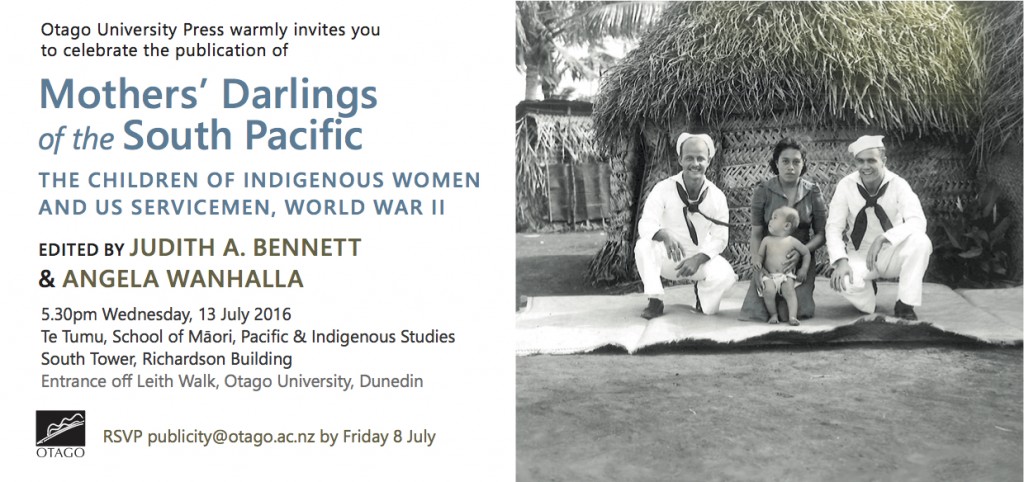Forthcoming Symposium. Valued Coconuts: Hear Our Voices
Prof. Judy Bennett is convening a pre-read symposium at the Hocken Collections on 16 & 17 January 2017. It is a key outcome from her Royal Society of New Zealand Marsden Project with Dr. Kate Stevens, Constant Coconuts: A history of a versatile commodity in the Pacific World.
This symposium focuses on six pre-circulated papers. They address different Pacific sites in regard to the history of a range of Indigenous interactions with coconuts in everyday life as well as a commodity. In addition to considering the variety of Indigenous voices, most papers also examine interactions of colonial agents—administrators, traders, planters, and mission organisations—with this commodity in the form of coconut oil or copra. There are to be assigned commentators for each paper, but presenters also have 20 minutes each to introduce and discuss their research to the wider audience.
All are welcome to attend and contribute to the discussions where appropriate. For more information contact Judy Bennett (judy.bennet@otago.ac.nz)
CFP: Film in the Colony
On 13 and 14 July 2017, the Centre for Research on Colonial Culture and Ngā Taonga Sound and Vision are hosting the Film in the Colony Symposium in Wellington.
Keynote Speakers: Dame Professor Anne Salmond (University of Auckland), Dr Ian-Malcolm Rijsdijk (University of Cape Town)
Organisers invite papers that investigate the cross-cultural processes of film production in the colonial context, and the ways in which indigenous and settler participants – performers, crew, or people from the localities where filming took place – took part in productions. In focusing primarily on New Zealand, South Africa and Australia, the symposium also seeks to develop a comparative analysis of the means through which film contributed to the making of national stories in the late colonial era, and how indigenous communities within these colonies engaged with the first few decades of film culture.
Contributions from a variety of disciplines and backgrounds are welcome, such as film studies, history, Māori and/or indigenous studies, anthropology, archives, screen industries, and communities.
Send a 200-word abstract and a brief bio to filminthecolony@otago.ac.nz by 28 February 2017.
Convenors: Annabel Cooper (Centre for Research on Colonial Culture, University of Otago), Diane Pivac, Honiana Love (Ngā Taonga Sound and Vision), Minette Hillyer, Jo Smith (Media Studies, Victoria University of Wellington).
Researching Teenage Histories
This is the title of Associate Professor Chris Brickell’s forthcoming talk to the New Zealand Presbyterian Research Network. Chris is giving the network’s Annual Lecture on Thursday 1 December starting at 5.30 in the Hewitson Wing, Knox College, Arden St. All are welcome to attend.
Inter-Colonial Exchange, Rivalry, and Cooperation in New Guinea: 1890-1945
Maaike Derksen, who is a Visiting Scholar with the Centre for Research on Colonial Culture, will present a research seminar on Wednesday 2 November on her current research relating to New Guinea. The talk begins at 11am in Te Iringa Kōrero (R3S10), on the third floor of Te Tumu: School of Māori, Pacific and Indigenous Studies. We hope to see you there on November 2nd!
Abstract
The 141 Meridian East was established as a colonial border across the Island of New Guinea in 1895. This border divided New Guinea and the adjacent Islands among three foreign powers; the Netherlands, Germany and Britain (later Australia). Nowadays it still effectively acts as one of colonial cartography’s boundaries, separating ‘Asia’ from ‘the Pacific’. In colonial and contemporary maps of (South) East Asia alike, one can see that Papua New Guinea is often curiously absent, while maps of the Pacific stop short of the New Guinea boundary. In this talk I examine the ways in which New Guinea offers an excellent opportunity to explore imperial interconnections and historicize the exchanges, rivalries, and cooperation that resulted.
The last decade, New Imperial scholarship has paid attention to (trans) imperial networks and the connection between motherland and colony within individual colonies. However, this neglects the economic, political, cultural, religious, migratory and cross-cultural entanglements that took place across the peripheries— between ‘neighboring’ colonies. The approach I propose challenges nationalist views of colonialism as well as such rigid views of ‘colonial’ boundaries. With a narrow lens of regional history (New Guinea) combined with the conceptual approach of inter-colonial entanglements I will be able to emphasize the complexities and messy realities of colonial encounters. Especially when entanglements between different actors are highlighted, one can see that colonial boundaries were fluid— that there was movement of goods, knowledge, and people, a formation of networks, shared internal and external threats to security. New Guinea offers numerous cases of cross-border exchange that are worth exploring; the establishment of colonial authority/administration; the networks of traders, pearl divers and bird of paradise hunters, the missionary endeavor of studying, civilizing and converting the indigenous population; the exploring, mapping of the region via scientific and military expeditions; the ‘pacification’ process, the invasion of Japan.
Biography
Maaike Derksen is a PhD candidate in at the History Department and Institute for Gender studies at the Radboud University of Nijmegen. Her research interests focus on colonial history, Christian missions, colonial anthropology, scientific expeditions and the Pacific War in the Dutch East Indies.
Screen Wars: Remaking the New Zealand Wars in Celluloid and Pixels
Centre member, Associate Professor Annabel Cooper, is presenting a video conference seminar for the The Identities Network: Constructing and Contesting Dominant Identities in Aotearoa on Tuesday 1 November, beginning at 3pm.
Annabel will be discussing her current project Screen Wars: Remaking the New Zealand Wars in Celluloid and Pixels, a book on screen productions relating to the New Zealand Wars, from 1925 until the present day. The book covers fictional and non-fictional treatments, and film, television and digital media. One distinctive quality that they all share makes screen stories a particularly significant mode of making history about the colonial past: their creation involves both Māori and Pākehā actors, historical advisors, and to greater or lesser extent, crew. For most of these productions the film-makers also elected to film at or near historical locations. So, film productions operate as sites of encounter as well as sites of knowledge production. To what extent are the traces of these encounters, and these whenua, apparent on the screen? Each of these productions created a colonial past for a specific present. This body of successive reiterations provides an index to cultural memory of the colonial past. So, the question of which historical events seemed most compelling to successive generations, how the same figures were rendered at different historical moments, and the shifting emotional registers as the wars came to be thought of in different ways, is also central to this study.
In this session Annabel will take two examples from her book to discuss the way each is shaped by the tangata and the whenua of their production, by their filming on location, and by the traces of their presents as they render their pasts.
Venue: Your University videoconference room or your desktop
Time: Tuesday 1 November, 3 – 4pm
Register: Email Melanie m.milicich@auckland.ac.nz stating the seminar name and venue Chair: Avril Bell
Family Ties, Literary Kinship and Creative Production in 19th Century Britain
On 12-14 February 2017, the Department of English and Linguistics, University of Otago, will host ‘Family Ties,’ an international symposium exploring literary kinship and creative production in nineteenth-century Britain. The CFP is below.
Plenary Speakers:
Judith Pascoe, University of Iowa
Devoney Looser, Arizona State University
In 1800, poet and playwright Joanna Baillie dedicated her Series of Plays to her physician brother Matthew Baillie for his “unwearied zeal and brotherly partiality”; Matthew himself had recently edited the anatomical research of their uncles, John and William Hunter. At century’s end, Oscar Wilde cited his mother Jane Wilde’s translation of Sidonia the Sorceress (1849) and his great-uncle Charles Maturin’s Melmoth the Wanderer (1820) as his “favourite romantic reading when a boy.” Family played an important role in the literary and artistic productions of the long nineteenth century, from the Burneys to the Brontës, and the Rossettis to the Doyles. Critical approaches ranging from Noel Annan’s “Intellectual Aristocracy” to Bruno Latour’s Actor-Network-Theory have provided useful ways of assessing and contextualising the role of family in the creative production of writers and artists, but still the role of the family remains under explored.
We invite submissions for “Family Ties” focused on British literary and artistic families in the nineteenth century. Topics for 20-minute papers might include:
Interdisciplinary Influences
Collaborations and/or Dissents
Authorial Identity/ies
Communities and Networks
Redefining Family Units
Stages of Life (births, marriages, deaths)
Reimaginings of nineteenth-century families
Families, Creativity, and Empire
Economics of Family Authorship
Literary and Artistic Legacies
Little-known Relations
Generational Influences
Please send abstracts of 250-300 words by 15 November to Dr Thomas McLean and Dr Ruth Knezevich at familyties@otago.ac.nz.
Details of the conference will be posted online here as they become available.
Book & Place Symposium
On 27 and 28 October, the University of Otago Centre for the Book is hosting its annual Research Symposium on the theme of Book and Place.
It will open on the evening of 27 October with a public lecture from Neville Peat in the Dunningham Suite, 4th floor, Dunedin Public Library, starting about 7.00 pm. You are cordially invited to come and listen to this well-known author reflect on his sense of book and place as he describes, in words and pictures, some of New Zealand’s most remote and precious areas and landmarks. An informal reception will follow the talk.
The Symposium proper will begin at the Marjorie Barclay Theatre, Otago Museum at 9.00 am on Friday 28. Professor Tony Ballantyne will begin proceedings, and after morning tea, Dr. Ingrid Horrocks of Massey University will deliver a plenary paper entitled: ‘Writing Place: A Case for Creative Nonfiction’. Nicky Page, Director of Dunedin’s UNESCO City of Literature programme will also be present. Please check out the full programme through the Centre for the Book blog
Importantly, for those attending the Thursday night ecture, please notify the Dunedin Public Library via their Library’s event site that you wish to attend.
To register for the symposium you need to send an email providing your name as you wish it to appear on your name tag and your email address to books@otago.ac.nz
There is no charge to attend the Symposium, which is generously supported by the Department of English and Linguistics, the Division of the Humanities, and the Centre for Research on Colonial Culture.
Research Seminar on Mono’i
We are pleased to announce that Centre member Dr. Kate Stevens will present a research seminar on Thursday 29th September in the University of Otago’s Department of Anthropology and Archaeology Seminar Series. Kate will talk on “Mono’i: Repackaging Tradition in Tahiti?”. Her seminar begins at 12pm, and will take place in Seminar Room 1, St David’s Complex. Hope to see you there!
New Historians Conference
Call for papers: The history postgraduate students at Victoria University of Wellington, Te Whare Wānanga o te Ūpoko o te Ika a Māui, warmly invite you to the 2016 New Historians Conference, to be held on Monday 17 and Tuesday 18 October.
First established in 2006 by Professor Melanie Nolan and postgraduate students, the conference attracts MA and PhD candidates and others who have recently completed their research.
It is an excellent opportunity to discuss current work and to share ideas.
Expressions of interest and 200 word abstracts are due 1 September.
Registrations are due by 15 September.
Keynote speakers will be confirmed shortly. Registration costs $25, to be paid on arrival at the conference. There will be an optional conference dinner on Monday night, costing $28-$35 per person.
Further details are available at: www.victoria.ac.nz/hppi/about/events
Please follow the event via Twitter: @HistoryatVic and use the hashtag #NewHist16.
Book Launch
Come along and celebrate the launch of Judy Bennett and Angela Wanhalla’s co-edited book, Mothers’ Darlings of the South Pacific, beginning at 5.30 on Wednesday 13 July at Te Tumu, University of Otago. Published by the University of Otago Press (a co-publication with University of Hawaii Press), Mothers’ Darlings traces the fate of the children fathered by US servicemen who served in the South Pacific Command Area during World War II and is the major outcome of Judy’s Royal Society of New Zealand Marsden Project of the same name.




